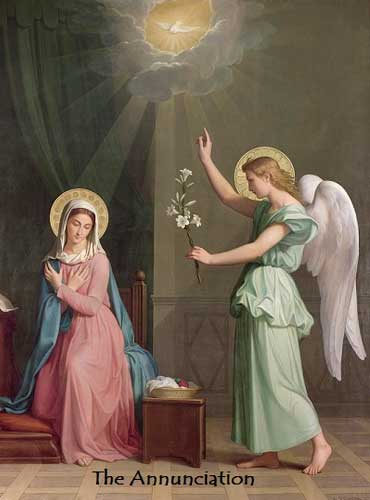December 20th – Lk 1:26-38
Today’s Gospel, taken from Luke, presents us with the well-known text of the Annunciation. While there is a great deal that can be said, we can focus simply on Mary’s docility to the Holy Spirit, since it is only through docility to the Holy Spirit that we can bear any fruit at all in our apostolates and through our religious life.[1] We can consider, first, what docility is, and, second, how to foster it in our lives.
Our word docile comes from the Latin docilis, meaning “easily taught,” which, in turn, derives from docere, “to show or to teach.” When we are docile to the Holy Spirit, then, it means, simply, that we allow Him to teach us, to guide us along the path of holiness. Since that path is different for each person, God inspires each one of us according to our needs, and since the spiritual life isn’t lived out in the abstract, His inspirations are constant, concrete, and certain. This could mean performing an act of charity for someone who needs it, or saying the right words to someone who needs encouragement, or really anything that advances God’s kingdom and our personal holiness.
In order to grow in our docility, there are a number of things that we can do. First, we must resolve to give ourselves wholeheartedly to God, since God doesn’t show the path to someone who won’t walk on it anyways. We must practice filial obedience, abandonment, and trust, since these enable us to be concerned about what God wants, and not simply what others will or what my preferences are. We do this in a particular way by being faithful to what we know God’s will is, revealed by things like our schedule, our superiors, and the like. We also need interior silence and recollection, since God doesn’t speak in the midst of the noise. Last, but certainly not least, we need to pray for this grace, since it comes from God, and He alone can grant it.
When we practice these things, our souls will become like Mary’s, allowing the fullness of the Divine Love to work in us. As Saint Francis de Sales wrote: “Holy love used its strength in the virginal heart of the holy Mother without any effort or rushing, because it found no resistance or hindrance whatever in her. For as we see great rivers foam and roar with loud noise in rough places where rocks make shoals and narrows that block and divert the current of the water, or on the other hand in level places, the same river flows and passes quietly without effort – so divine love, finding resistance and various hindrances in human souls (which everyone has to some degree but in different ways), does violence in such souls, fighting bad inclinations, beating on the heart, pushing the will by various disturbances and different efforts to get room for itself or at least to find some way around these obstacles. But in the holy Virgin everything favored and supported the course of heavenly love. Its progress and increase in her were incomparably greater than in all the rest of creation, yet nevertheless sweet, peaceable, and quiet.”[2]
As we continue through this Advent season, let us ask, through the intercession of Mary, Spouse of the Holy Spirit, for the grace to imitate her in her docility to the Holy Spirit, and thus to grow every closer to Her Divine Son and better accomplish His will.
[1] “For the Sisters of the SSVM . . . spiritual motherhood is profoundly marked by the action of the Holy Spirit
and the example of Mary. . . . Hence the religious must let the Divine Spirit work in her, in the likeness of
Blessed Mary, whom the power of the Most High overshadowed, becoming fruitful.” Maria de Anima Christi Van Eyjk, “The Superior. Faith in the Saving Mystery of Evangelical Authority.” The Incarnate Word, vol. 1, no. 4, 816.
[2] Cited in Jacques Philippe, In the School of the Holy Spirit (Scepter, 2007): 84-85. The main points of this homily are taken from this book.






